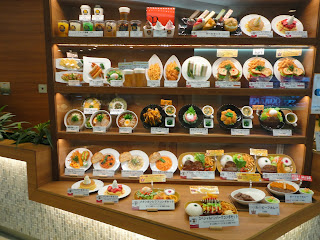 |
| This right here. |
Since then it's become better. My host family will ask what amount I think I can handle, especially of rice (that stuff is filling!). But before that point I would feel really bad about not finishing the food, even more so when I was told that rice holds a special significance to Japanese people and that, out of courtesy, I should at least finish the rice bowl, if not anything else. I have to really thank my host family for explaining it to me in as understanding a way as they did, plus continuing to handle all of my nuisances (I can't slurp soup or noodles! I make a big mess because I still can't use chopsticks correctly! Sometimes I need a fork anyway!). On one night, since I had so much left over I suggested that maybe I could finish it the next morning, so my host mother showed me how to use the microwave and set it out for me before she left for work. I ate it alone, in the dark, since I couldn't work the lights, as quietly as I could. That was not a good day for me.
I do have to mention that the food tastes fantastic. Don't think I didn't like the food that was leftover: it was curry udon. I've been told that in the Kanto region people will make curry rice two nights in a row, but in Kansai they will use the leftover curry from the first night to make udon. Man. Is. It. Good. Then there was a fried potato I had only eaten half of and my host mother threw in an onigiri, which are always fabulous. Every night has been something different, as far as I can tell (but always with a bowl of rice), and in the mornings I usually default to toast because I need something familiar once in a while. People, if you haven't tasted the seafood of Japan... just do it. Just hop on over here and grab a bite. I haven't even tasted takoyaki and I'm already hooked. The only thing I wouldn't recommend is natto, although one of my French classmates thinks it's utterly delicious so at least try it once.
If you've been told that prices are much higher here than in the US, you've been lied to. It really depends, though; go to a regular grocery store and you'll find ingredients for Japanese cuisine for cheap. If you want to make American food items, though, you might have a harder time. Vending machines dispense 100-yen ($1) coffee, juice, soda, and beer. I don't drink alcohol, but one of my classmates was talking about a 1000-yen ($10) all-you-can-drink bar, probably only at certain times but still. Whereas a complete meal at my home university would be around $6-8, on the campus here it would be $4-6, but usually I spend more like $2-3 because I'm cheap and, like I said, the rice is plenty filling. Today I walked around the neighborhood and found a few cute little shops, plus one sweet lady who coerced me into buying an apple for 50 yen (about $.50, but I could've had 5 for 100 yen so maybe I'll go back later and stock up for the week's lunches!) and a cafe where I got a chocolate croissant for about 120 yen. It's really nice to just walk around, and today's weather was fantastic. Yeah, I feel pretty good. It feels like that "breakfast of shame" was a whole week ago...



